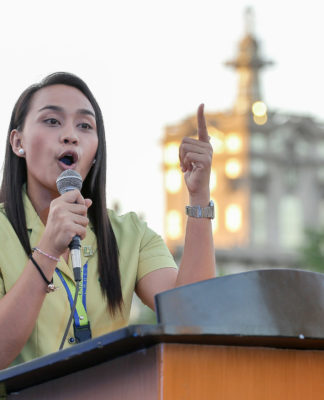
Journalism in the Philippines is in crisis amid attacks on media outlets and “systematic disinformation,” Arts and Letters journalism professor Christian Esguerra said in his keynote address in an annual journalism conference at UP Diliman on Friday.
The situation is aggravated by a misunderstanding of what the profession is all about, Esguerra said before an audience of journalism educators and students at the 2020 Philippine Journalism Research Conference (PJRC).
He cited repeated accusations of political bias from no less than President Rodrigo Duterte’s spokesman, Salvador Panelo.
“That, to me, is an unfortunate misunderstanding of how journalists are supposed to work. We’re neither pro- nor anti-Duterte,” said Esguerra, also a senior reporter and anchor for ABS-CBN News.
“We are simply journalists, who believe that every administration should be scrutinized, whether you are Gloria Macapagal-Arroyo, Benigno Aquino III, or Rodrigo Duterte,” he added.
Esguerra clarified that the concept of objectivity in journalism referred to the process of gathering verifiable information, not absolute neutrality.
“We know for a fact that reporting involves subjective decisions, choosing to highlight one detail, one angle over another. That, strictly speaking, is bias,” he said.
“But we follow standards, a method that tests the reliability and credibility of facts to come up with what Stephen Ward describes as ‘an objective news report’ that is ‘an objective interpretation’ of these information,” he added. “It’s the objectivity of the process, the closest journalism can get to the scientific method.”
Esguerra also said many journalists were often co-opted by the government or were practicing self-censorship, because of a climate of fear fostered by the Duterte administration following attacks on three media outlets: Rappler, ABS-CBN and the Philippine Daily Inquirer.
“Many of us play safe, careful not to attract unnecessary attention. We go to work. We cover. We write. We go home,” he said.
“It’s the fear that if we commit even the slightest, most innocuous error — which can happen, though not necessarily malicious — we will be attacked on social media, branded as ‘bobo,’ ‘tanga,’ ‘bayaran,‘ ‘pangit at mamatay ka na sana,’” he said.
Esguerra admitted that journalism is an “imperfect tool” but emphasized its important function in a democratic society.
“There is simply a lot of things that need to be fixed within the news media industry, within ourselves. But we soldier on. We thrive. And often, we succeed. Just imagine how much more we can achieve, if that which we call ‘profession’ isn’t all that bad,” he said.
The research conference, which had the theme “Journalism in Dangerous Times,” was held at the UP Cine Adarna and hosted by the Department of Journalism of the UP College of Mass Communication.
It was co-organized by the University of Santo Tomas Journalism Program, the Polytechnic University of the Philippines, and the Asian Institute of Journalism and Communication.













